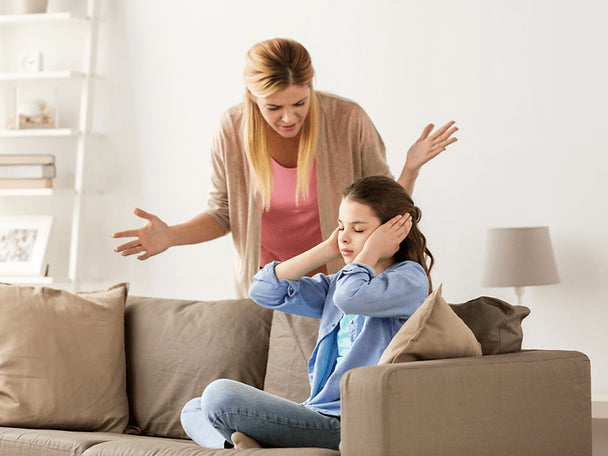Whether you know one, or you are one, ‘helicopter parents’ cop a lot of flack. But what are the real dangers of helicopter parenting, how can you identify the behaviours associated with it, and what can you do to stop them?
We asked parenting expert, international best-selling author and podcast host and father Brendon Watt exactly what helicopter parenting is – and how (and why) to stop it.
“Helicopter parenting is when we hover over our kids and pay attention to their every move, to the point that we try to control them,” says Brendon. “If you find that you’re constantly judging yourself for doing the ‘wrong’ thing as a parent, or judging your children for being wrong, that could also be a sign that you’re a helicopter parent.”
As parents, we often think that if we can control our kids, they will turn out to be perfect, wonderful children. But what we’re actually doing, Brendon says, is teaching them to constantly stress out, and disempowering them from being able to create for themselves in the future.
“We can have these ideas of the type of parent we are supposed to be, or the type of child we want to raise, and as a result we can make ourselves wrong when expectations don’t match reality,” says Brendon.
It’s worth noting that helicopter parenting is a sign of the times. Being so aware of the turmoil going on around the world means parents feel the instinct to protect their kids even more keenly, which some do by trying to control their every move.
“But what we’re actually doing is teaching fear and creating further turmoil,” says Brendon. “We’re creating a point of view and pushing it onto our kids, and they’re adopting that point of view as a result.
“Take this example: I have friends with kids in school and the kids have to wear masks all day. I initially thought that was a sad and hard thing for the kids, but when I spoke to them, they didn’t mind at all and had even bought some cool masks. I was pushing a point of view onto them that they hadn’t even considered!”
So, if helicopter parenting isn’t a guaranteed way to protect our children (and could possibly do more harm than good), what should we be doing instead?
“What actually empowers your children, and you as a parent, is teaching them awareness by asking questions, like ‘if I choose this, what will it create?’” says Brendon.
Instead of telling your child “don’t do that, it’s wrong”, ask them “what will choosing this create for you?”. This gives your children the ability to start thinking about the consequences of their choices, what it means to be in tune with their gut and their instincts, and what actually makes them feel alive and excited about life.
“Another way to combat helicopter tendencies is to explain to your kids why you have certain rules,” says Brendon. “Instead of just saying ‘this is wrong, don’t do it’, give them information about what it can create that isn’t great.
“Doing this shows your kids that you respect them enough to involve them in your choices, and helps them begin to understand why certain rules can actually be helpful.”
Another tip Brendon wants parents to take on board? Stop judging yourself!
“You aren’t always in the wrong when things don’t turn out the way you’d hoped,” says Brendon. “Instead of thinking ‘geez, I’m such a bad parent,’ practice allowance and say ‘okay, this is what that choice has created. What is a different choice I can create?’”
You can also involve your kids in this. Make sure to apologize and be honest with them by saying something to the effect of, ‘I thought that was the best choice but now I’m thinking I could have chosen differently, will you forgive me?’.
“Kids can benefit from you leading by example and admitting that you’re not perfect!” says Brendon. “You don’t need to be perfect for your kids. If anything, your kids are looking to you as a source of knowledge and creation, and if they can see that you constantly revaluate, admit your mistakes and are committed to growth, they will follow your lead.”
But on the other hand, Brendon implores us parents to stop judging our kids – whether it’s because they aren’t quite like us, don’t want to do things we think are right, or simply because, in our eyes, they or something they have done is ‘wrong’.
“Our kids are still going to grow up as who they are going to grow up as – no matter what you give them, they will still want to make their own choices,” says Brendon. “They might not love the same things that you do, so instead of thinking ‘You need to play sports because that is the right thing to do,’ how can you contribute to the things they love and give them the space to create what they desire?”
It’s about taking a step back to see who our kids really are. This can be a hard thing to do, particularly with multiple kids, but it’s an invaluable way to recognise the strengths that will empower them in their life, and know what excites and inspires them.
“Everyone is different!” says Brendon. “What I’d love to see in the world is more kids growing up with confidence in themselves and their abilities, who truly believe that they can actually make the choice to change the world.”
And the best way to empower them to make that choice is to raise them with independence and self-confidence – not just good behaviour.
Source: https://www.havenmagazine.com.au/how-to-combat-helicopter-parenting/

